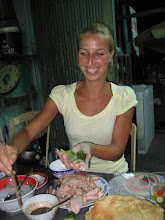Ikke langt fra succes til fiasko… hvor pinligt kan det blive...
Sara, Jannie og Jeg havde igen allieret os med Peter og fik lov at bruge hans onsdags engelsk-undervisningstime til at holde vores workshop... Denne gang havde vi valgt temaet: anerkendelse og flow og synes egentlig selv, at vi havde kædet det ok sammen og vi havde også valgt, at lave noget skuespil for lærerinderne - da det jo gik så godt sidst...
Nå, men det var mig som skulle lægge ud med at sige noget, men mens jeg snakkede, snakkede de fleste af lærerinderne også og der gik et stykke tid før de rent faktisk begyndte, at høre efter... Vi tegnede og fortalte og kunne godt se, at lærerinderne var noget ukoncentrerede og egentlig bare ville hjem... Da vi skulle lave skuespillet, måtte vi sætte os i midten af den hestesko, som lærerinderne (ca. 40 pers.) sad i og det blev hurtigt tydeligt for os, at de ikke blev så fanget af det, som sidste gang, hvilket gjorde situationen SÅ pinlig: her sad vi og legede børn midt på gulvet (og snakkede engelsk)... mens de sad lettere skeptiske og så på og vist ikke helt forstod hvordan og hvorfor...
Men efter 45min-1 times tid var vi endelig færdige og staks som vi havde sagt tak fordi i lyttede, rejste alle lærerinderne sig og skyndte sig afsted - Hmm ja det var nok så tæt på en fiasko man kan komme...
Peter var dog sød at give os ros og synes det var nogle rigtig gode emner vi havde taget fat i og gav os et råd om, at hvis vi havde fået Phuong (Dr. Lans sekretær) til at oversætte power-point præsentationen til vietnamesisk, så havde lærerinderne måske fået mere ud af det...
Vores workshop ses nedenfor.
Today we like to talk about how you can use flow and regination in the daily work in the classrooms at Sao Mai.
First we would like to talk about the definition of flow.
Flow is a state of mind where you lose track of time and place, and you’re completely focused on the things you are doing. The state of flow happens when you are enjoying what you are doing, and when the challenges matches your skills
For eksample: flow is what happens, when you go out and sing karaoke all night with your friends, you are totally focused on the song and forget everything else around you (-:
When the challenges and skills don’t match
If the challenges are set too low compared to your skills, you will end up getting bored and uninterested in the thing you are supposed to be doing.
Assignment: Write your name on apice paper 30 times and see how it makes you feel.
When the challenges and expectations are set too high compared to your skills, you will end up getting frustrated and anxious and give up on the thing you were supposed to be doing.
Assignment: Now try to write you name 30 times with the oppisite hand than you are use to and see how it makes you feel
( Udfordring = Challenge and Kompetence = skills)
Lav = low and Høj = high
Kedsomhed = Bored or uninterested and Angst = Anxiety)
(This is a diagram explainling flow and the two zones, that we just explained. We will run through this and try to follow up what we just talked about….)
And now we like to talk about the definition of recognition.
Recognition
Recognition is when you see and understand a childs/persons needs and emotions.
If a child/person doesn’t get recognitions the consequence can be tha the child/person will end up feeling less worthy and feel that their emotions are wrong. In worst case senario, it can result being unengages and being passive in it’s life.
For exsamble if a child cries and it doesn’t get the recognition and comfort it’s needs, the child might think that his or hers feelings is wrong and eventually stop showing his emotions because he thinks they are wrong.
How to recognise a child.
Exsample of an everyday episode without the use of recognition (skuespil).
Exsample of an everyday episode with the use of recognition (skuespil).
Another exsample of an everyday episode without the use of recognition (skuespil).
How could you see the use of recognition in this exsample (til lærerinderne)?
Another way to recognize a child is to plan different lessons so that the challenges matches the skills of the induvidual child.
When you plan the lessons from the induvidual childs needs and skills, you recognize the child and thereby support the childs further development.
Do you have any questions?


Ingen kommentarer:
Send en kommentar